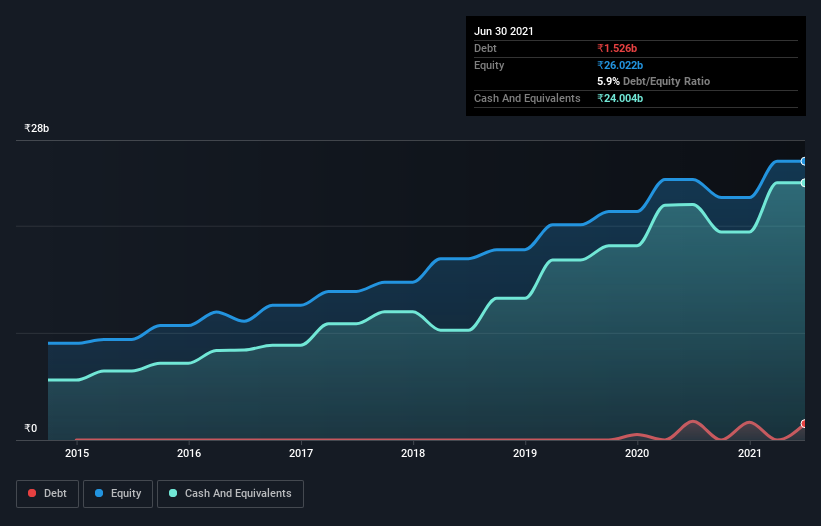Abbott India (NSE:ABBOTINDIA) Has A Rock Solid Balance Sheet

Some say volatility, rather than debt, is the best way to think about risk as an investor, but Warren Buffett famously said that 'Volatility is far from synonymous with risk.' So it might be obvious that you need to consider debt, when you think about how risky any given stock is, because too much debt can sink a company. Importantly, Abbott India Limited (NSE:ABBOTINDIA) does carry debt. But should shareholders be worried about its use of debt?
Why Does Debt Bring Risk?
Debt assists a business until the business has trouble paying it off, either with new capital or with free cash flow. In the worst case scenario, a company can go bankrupt if it cannot pay its creditors. However, a more common (but still painful) scenario is that it has to raise new equity capital at a low price, thus permanently diluting shareholders. Of course, plenty of companies use debt to fund growth, without any negative consequences. The first thing to do when considering how much debt a business uses is to look at its cash and debt together.
View our latest analysis for Abbott India
What Is Abbott India's Net Debt?
As you can see below, Abbott India had ₹1.53b of debt at March 2021, down from ₹1.75b a year prior. However, its balance sheet shows it holds ₹24.0b in cash, so it actually has ₹22.5b net cash.

How Healthy Is Abbott India's Balance Sheet?
We can see from the most recent balance sheet that Abbott India had liabilities of ₹10.3b falling due within a year, and liabilities of ₹2.07b due beyond that. Offsetting these obligations, it had cash of ₹24.0b as well as receivables valued at ₹3.72b due within 12 months. So it actually has ₹15.3b more liquid assets than total liabilities.
This short term liquidity is a sign that Abbott India could probably pay off its debt with ease, as its balance sheet is far from stretched. Succinctly put, Abbott India boasts net cash, so it's fair to say it does not have a heavy debt load!
Also good is that Abbott India grew its EBIT at 19% over the last year, further increasing its ability to manage debt. The balance sheet is clearly the area to focus on when you are analysing debt. But it is Abbott India's earnings that will influence how the balance sheet holds up in the future. So when considering debt, it's definitely worth looking at the earnings trend. Click here for an interactive snapshot.
Finally, a company can only pay off debt with cold hard cash, not accounting profits. Abbott India may have net cash on the balance sheet, but it is still interesting to look at how well the business converts its earnings before interest and tax (EBIT) to free cash flow, because that will influence both its need for, and its capacity to manage debt. Over the most recent three years, Abbott India recorded free cash flow worth 75% of its EBIT, which is around normal, given free cash flow excludes interest and tax. This free cash flow puts the company in a good position to pay down debt, when appropriate.
Summing up
While it is always sensible to investigate a company's debt, in this case Abbott India has ₹22.5b in net cash and a decent-looking balance sheet. The cherry on top was that in converted 75% of that EBIT to free cash flow, bringing in ₹7.0b. So is Abbott India's debt a risk? It doesn't seem so to us. Over time, share prices tend to follow earnings per share, so if you're interested in Abbott India, you may well want to click here to check an interactive graph of its earnings per share history.
If you're interested in investing in businesses that can grow profits without the burden of debt, then check out this free list of growing businesses that have net cash on the balance sheet.
If you decide to trade Abbott India, use the lowest-cost* platform that is rated #1 Overall by Barron’s, Interactive Brokers. Trade stocks, options, futures, forex, bonds and funds on 135 markets, all from a single integrated account. Promoted
New: Manage All Your Stock Portfolios in One Place
We've created the ultimate portfolio companion for stock investors, and it's free.
• Connect an unlimited number of Portfolios and see your total in one currency
• Be alerted to new Warning Signs or Risks via email or mobile
• Track the Fair Value of your stocks
This article by Simply Wall St is general in nature. We provide commentary based on historical data and analyst forecasts only using an unbiased methodology and our articles are not intended to be financial advice. It does not constitute a recommendation to buy or sell any stock, and does not take account of your objectives, or your financial situation. We aim to bring you long-term focused analysis driven by fundamental data. Note that our analysis may not factor in the latest price-sensitive company announcements or qualitative material. Simply Wall St has no position in any stocks mentioned.
*Interactive Brokers Rated Lowest Cost Broker by StockBrokers.com Annual Online Review 2020
Have feedback on this article? Concerned about the content? Get in touch with us directly. Alternatively, email editorial-team (at) simplywallst.com.
About NSEI:ABBOTINDIA
Flawless balance sheet with solid track record and pays a dividend.

